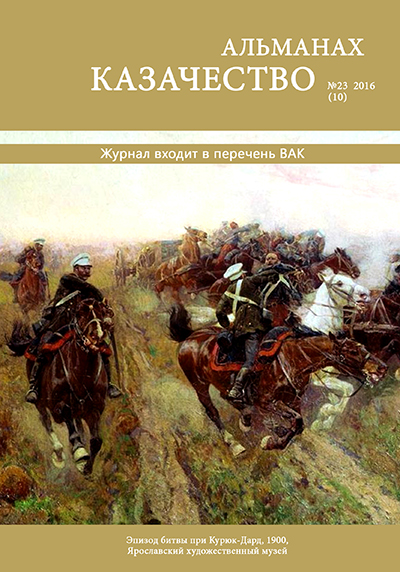Content
| History | |
| Bredihin A.V. Heirs of Byzantium. Don Cossacks and Romei | 7 |
| Rybakov S.V. Some pages of the history of relations of Russia with Byzantium | 11 |
| Bartosh A.A. Kuban troopers in the Caucasian Army | 18 |
| Shakhov S.K. The historical development of a multi-ethnic Russian state: vector ethnic and cultural unity of the North Caucasus | 28 |
| Surovcev S.I. History of development and substantial characteristics of lobbying activities in the context of its legal regulation | 36 |
| Parfenova S.R. Compulsion to seek party identity youth as a technology solution to the problems of electoral activity | 41 |
| Geopolitics and patriotic education | |
| Emcova A.A. Informal political influence on the regional media. Modern features | 53 |
| Filonenko A.E. Some aspects of Russian ensuring economic stability in Central Asia and its promoting regional development (2000-2016) | 60 |
| Buyanov V.S., Gadjieva R.G. Geopolitics and World Culture | 71 |
| Abstracts | 89 |
| Authors | 93 |
Abstracts
Rybakov S.V.
Some pages of the history of relations of Russia with Byzantium
The roots and the origins of Russian civilization largely is associated with the Byzantine Empire. From the first moments of its history, Russia has interacted with Byzantium, taking her experience in nation-building, development of culture, education, religion. Some aspects of this interaction are illuminated in this article.
Keywords: civilization, culture, Byzantium, Russia, Orthodox, the baptism of Rus’.
Bartosh A.A.
Kuban troopers in the Caucasian Army
Today martial routes-Plast scouts along the coast of Krasnodar region and Abkhazia are of considerable interest for the organization of tourist trips.
Keywords: Kuban, troopers, army, east, history, culture.
Shakhov S.K.
The historical development of a multi-ethnic Russian state: vector ethnic and cultural unity of the North Caucasus
In the given work the results of critical and analytical review based on the information about historical development of the Russian multi-ethnic state in the forming of the Dagestan ethno-political and ethno-cultural unity in the North Caucasus.
There are given the data on the existing problems in the conducting Russian intercultural policy to ensure the nonconfrontational ethnic interaction.
The basic factors that contribute to inter-ethnic strife and weaken the state, such as voluntary concepts and unbalance of internal policy in the course of evolutionary development of the Caucasus region.
The conclusion is that the solution of the problem is defined in the flexible planning of the national policy of the state on the principles of democracy and federalism.
Keywords: identity, strategy, disorganization, ideology, federalism, innovation, progress.
Stanislav S.I.
History of development and substantial characteristics of lobbying activities in the context of its legal regulation
This article explores the formation and development of lobbying institution in Russia and abroad, describes the peculiarities of its regulation. The paper details the legal acts regulating the procedure and methods of lobbying in public authorities, the features of the development of the lobbying legislation in the historical context. Particular attention is paid to the legal basis of lobbying activities, its forms and methods. The author analyzes the prerequisites for the formation of lobbying as a legal institution, establishes its interconnection with other phenomena of political and legal life, explores the problems arising in connection with government relations in the public authorities.
Keywords: lobbying, interest groups, regulation of lobbying activities, lobby, Lobbying Disclosure Act 1995, the United States, parliamentarianism, forms of interest representation.
Parfenova S.R.
Compulsion to seek party identity youth as a technology solution to the problems of electoral activity
This article discusses the possibility of using educational technology as a tool to influence to seek political (party) identity of students how to solve problems of electoral activity.
Keywords: political (party) identity, electoral activism, personal values, voting behavior, the education system.
Emcova A.A.
Informal political influence on the regional media. Modern features
One of the most popular ideas about media in society is that in which they act as a powerful entity, able to monitor, investigate and initiate prosecution in case of criminal acts. The article discusses the question when a powerful entity becomes the object of manipulation by government agencies.
Keywords: informal influence, state power, media.
Filonenko A.E.
Some aspects of Russian ensuring economic stability in Central Asia and its promoting regional development (2000-2016)
The article reviews mutually beneficial economic cooperation between Russia and the Central Asian countries. Particular attention is paid to the Russian promotion of the region.
Keywords: Russia, Central Asia, economic cooperation, promote the development of Central Asia, China, the Eurasian Economic Union.
Buyanov V.S.
Gadjieva R.G.
Geopolitics and World Culture
The article provides an overview of the theories of civilization, civilizations classification and analysis of the impact of the interaction of contemporary civilizations in the geopolitical processes in the world. The authors emphasize the importance of civilized approach in the examination of the historical process in the context of geopolitical interaction.
Keywords: geopolitics, civilizational factor, cultural diversity, civilizational identity, the classification of civilizations, dialogue of civilizations.
Authors
Bartosh A.A., Corresponding Member of the Russian Academy of Military Sciences.
Bredihin A.V., Candidate of Historical Sciences, Senior Researcher of Center Political Studies of Government Financial University, Researcher of Sector political science and cultural analysis of the Center for Development and Modernization, Primakov National Institute of World Economy and International Relations of Russian Academy of Sciences.
Buyanov V.S., Doctor of Philosophy, Professor.
Emcova A.A., Graduate Student of the Russian Presidential Academy of National Economy and Public Administration.
Filonenko A.E., Graduate Student of the Theory and History of International Relations Chair RUDN University.
Gadjieva R.G., Candidate of Psychology, Docent.
Parfenova S.R., PhD (Candidate of Legal Sciences), Associate Professor of philosophy and political science in “Bashkir State University”.
Rybakov S.V., Doctor of historical sciences, professor of the history of Russian Ural Federal University (Ekaterinburg, Russia).
Shakhov S.K., Candidate of Political Sciences, Vice-rector of DIRO.
Surovcev S.I., Postgraduate Researcher, Department of Constitutional Law, MGIMO(University) under the MFA of Russia, State Duma Deputy Assistant.



